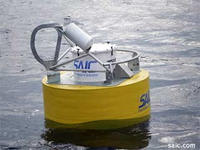-
Innovative hydroelectric solution harvests power from water flowing through municipal pipes
An innovative solution has made it so dams do not have to be built in order to get hydroelectricity; hydroelectric power can now be harvested from water flowing through municipal pipes; the innovation is creating energy by using existing infrastructure, as well as solving a problem in that infrastructure
-
-
Law-enforcement agencies eager for Web-surveillance tools

Private technology firms are pitching software capable of analyzing large swaths of the Internet to local law enforcement looking for ways to stop the next mass shooting or domestic terrorist event before it happens; police departments hope the software will help them detect online information from terrorists, traffickers, pedophiles, and rioters
-
-
Many of the U.S. 20 million manholes are in need of immediate rehabilitation or replacement

The EPA estimates that there are about twenty million manholes in the United States – or one manhole for every 400 feet of pavement on average; many of those manholes are in serious decay or in need of immediate rehabilitation or replacement
-
-
Testing new pavement materials
Scientists are trying to determine the durability of recycled materials for use in road construction; a Texas university is building a new accelerated pavement testing center, with the overall road pad at the accelerated pavement testing center could be a little bigger than a half-acre in size
-
-
MIT expert: “toxic” political discussions limit climate response
In a talk at the Sandia National Lab, an MIT expert says the inability of natural and social scientists to convince political leaders that “we’re spinning a roulette wheel over climate change” puts humanity at “extreme risk,” and that the difficulties in using science to push for mitigation strategies are more political than scientific
-
-
As shoe-scanning devices fail, passengers continue to remove their shoes

In the last five years the U.S. government has tested several scanning devices for detecting explosives and other weapons concealed in the shoes of airline passengers; after spending millions of dollars on these devices, TSA has concluded that the detection systems are ineffective; the result: removing shoes at security check points is going to be a part of air travel for the foreseeable future
-
-
Storing government records for generations to come
A White House directive released last week requires that federal agencies adopt systems which will store and manage all electronic records in order to keep them safe and secure for future generations
-
-
In China, corruption blamed for collapse of bridges
Since 2011 eight bridges have collapsed in China, according to the state run media, including the Yangmingtan Bridge in the city of Harbin last November; the bridge was almost 10-mile long and construction was originally estimated to take three years, but workers finished it in half the time; when the bridge collapsed, the first thing on people’s mind was corruption
-
-
Safety & Security Asia 2012 is back for its second edition in Jakarta, Indonesia
Safety & Security Asia (SSA 2012) is back for its second edition in Jakarta, Indonesia; foreign investors have been pumping in close to $19.3 billion into the Indonesia’s market – this fact, and the fact that the Indonesian government and business remain aware of the threat of terrorism, create a an opportunity for security companies; SSA 2012 aims to help businesses explore these opportunities
-
-
U.S. demand for security products to rise 7.3 percent annually through 2016
The U.S. market for security products is expected to increase 7.3 percent per year to $21 billion in 2016; ongoing technological improvements that enhance the accuracy, ease of use, and speed of operation of electronic security systems will bolster spending, not only by fueling interest in upgrading existing security systems but also by improving market penetration
-
-
Engineers develop electricity-free home cooling system
Researchers are developing a solar cooling and heating system for the home which will run independently of the electricity grid and generate domestic hot water as a by-product
-
-
Industry fights Pentagon efforts to restrict exporting of infrared products
The global market for infrared technology products will be worth about $2.6 billion dollars by 2017; the technology can be used for commercial products such as automotive, surveillance, and security industries – and is heavily used by the military; three major U.S. infrared equipment makers fight the Pentagon’s efforts to restrict exports of devices based on the technology for fear these devices may enhance the military capabilities of adversaries of the United States
-
-
The costs, benefits, and efficiency of aviation security measures
The threat of terrorist attack on American aviation has made the system the focus of intense security efforts, but it is difficult to determine if the benefits outweigh their cost; efficient security policy — a focus on getting the most security for the least cost — should be the priority in an era of fiscal austerity, says a new RAND report
-
-
China’s growing role in U.S. infrastructure building, maintenance
The building and maintenance of heavy infrastructure in the United States, which includes road, mass transit, marine, and building construction, is worth $44.1 billion per year and $12 billion in annual wages; bridge and tunnel construction is worth an estimated $24 billion in revenue and $4.3 billion in wages; many wonder why, in this difficult times, states and municipalities hire Chinese companies for many of these infrastructure projects
-
-
Japan awards tsunami buoy contract to SAIC

The Japan Meteorological Agency (JMA) in Tokyo, Japan, has awarded (SAIC) a contract for the production and delivery of six SAIC Tsunami Buoy (STB) systems; the STB systems will be deployed at locations in the northwest Pacific Ocean approximately 200 nautical miles east of Sendai, Japan
-
More headlines
The long view
Factories First: Winning the Drone War Before It Starts
Wars are won by factories before they are won on the battlefield,Martin C. Feldmann writes, noting that the United States lacks the manufacturing depth for the coming drone age. Rectifying this situation “will take far more than procurement tweaks,” Feldmann writes. “It demands a national-level, wartime-scale industrial mobilization.”
Trump Is Fast-Tracking New Coal Mines — Even When They Don’t Make Economic Sense
In Appalachian Tennessee, mines shut down and couldn’t pay their debts. Now a new one is opening under the guise of an “energy emergency.”
Smaller Nuclear Reactors Spark Renewed Interest in a Once-Shunned Energy Source
In the past two years, half the states have taken action to promote nuclear power, from creating nuclear task forces to integrating nuclear into long-term energy plans.
